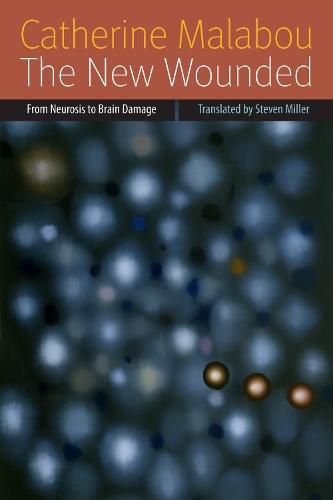Full Product Details
Author: Catherine Malabou ,
Steven Miller
Publisher: Fordham University Press
Imprint: Fordham University Press
Dimensions:
Width: 15.20cm
, Height: 2.00cm
, Length: 22.90cm
Weight: 0.485kg
ISBN: 9780823239672
ISBN 10: 0823239675
Pages: 268
Publication Date: 01 May 2012
Audience:
Professional and scholarly
,
College/higher education
,
Professional & Vocational
,
Postgraduate, Research & Scholarly
Format: Hardback
Publisher's Status: Active
Availability: In Print

This item will be ordered in for you from one of our suppliers. Upon receipt, we will promptly dispatch it out to you. For in store availability, please contact us.
Reviews
The first of the 'old wounded,' hysterics suffering from reminiscences, were Freud's co-conspirators in the invention of psychoanalysis. Not only were they its earliest patients and critics; their malady formed the very stuff of psychoanalysis. Malabou identifies a more recent class of 'new wounded'-Alzheimer's patient, autistic children, concentration camp survivors, victims of rape, bombing, natural disasters and brain tumors-who, radically severed from their own past, are devoid not only of reminiscences but of meaning itself. Their maladies, she claims, evacuate the core concepts of psychoanalysis, its original stuff. Friends and foes of Freud's science will be riveted by Malabou's intelligent argument whose destructive thrust produces not merely rubble and dust, more a foam of fascinating new concepts-including cerebrality and destructive plasticity-and strong readings of Freudian texts. -- -Joan Copjec University at Buffalo, SUNY Malabou draws upon the most current neurological research and contemporary psychoanalytic works, and applies them to a careful, penetrating and convincing reading of Freud's primary texts, in order to fashion her original interpretation. -- -Clayton Crockett University of Central Arkansas What has happened when subjectivity is utterly changed by brain damage? What are the links of war, trauma, and loss of affect? In The New Wounded Catherine Malabou brilliantly shows how 'destructive plasticity' is the key concept for understanding our 'new economy of pain.' Highly recommended for everyone in the fields she so deftly examines: philosophy, psychoanalysis, and neurology. -- -John Protevi Louisiana State University
GCGBPMalabou draws upon the most current neurological research and contemporary psychoanalytic works, and applies them to a careful, penetrating and convincing reading of FreudGCOs primary texts, in order to fashion her original interpretation.GC[yen] GCoClayton Crockett, University of Central Arkansas Malabou draws upon the most current neurological research and contemporary psychoanalytic works, and applies them to a careful, penetrating and convincing reading of Freud's primary texts, in order to fashion her original interpretation. -Clayton Crockett, University of Central Arkansas
What has happened when subjectivity is utterly changed by brain damage? What are the links of war, trauma, and loss of affect? In The New Wounded Catherine Malabou brilliantly shows how 'destructive plasticity' is the key concept for understanding our 'new economy of pain.' Highly recommended for everyone in the fields she so deftly examines: philosophy, psychoanalysis, and neurology. -- -John Protevi * Louisiana State University * Malabou draws upon the most current neurological research and contemporary psychoanalytic works, and applies them to a careful, penetrating and convincing reading of Freud's primary texts, in order to fashion her original interpretation. -- -Clayton Crockett * University of Central Arkansas * The first of the 'old wounded,' hysterics suffering from reminiscences, were Freud's co-conspirators in the invention of psychoanalysis. Not only were they its earliest patients and critics; their malady formed the very stuff of psychoanalysis. Malabou identifies a more recent class of 'new wounded'-Alzheimer's patient, autistic children, concentration camp survivors, victims of rape, bombing, natural disasters and brain tumors-who, radically severed from their own past, are devoid not only of reminiscences but of meaning itself. Their maladies, she claims, evacuate the core concepts of psychoanalysis, its original stuff. Friends and foes of Freud's science will be riveted by Malabou's intelligent argument whose destructive thrust produces not merely rubble and dust, more a foam of fascinating new concepts-including cerebrality and destructive plasticity-and strong readings of Freudian texts. -- -Joan Copjec * University at Buffalo, SUNY *
<br> Malabou draws upon the most current neurological research and contemporary psychoanalytic works and applies them to a careful, penetrating, and convincing reading of Freud's primary texts in order to fashion her original interpretation. -Clayton Crockett, University of Central Arkansas <br>Clayton Crockett, University of Central Arkansas<p><br>
Author Information
Catherine Malabou (Author) Catherine Malabou, holder of Visiting Chairs in numerous North American universities, teaches philosophy at the CRMEP (Center for Research in Modern European Philosophy) at Kingston University (UK). The most recent of her books are, Changing Difference: The Feminine in Philosophy, and, with Judith Butler, You Will Be My Body for Me. Steven Miller (Translator) Steven Miller teaches in the Department of English at the University ay Buffalo (SUNY). He is author of War After Death: On Violence and Its Limits and translator of books by Jean-Luc Nancy, Catherine Malabou, and Étienne Balibar.




